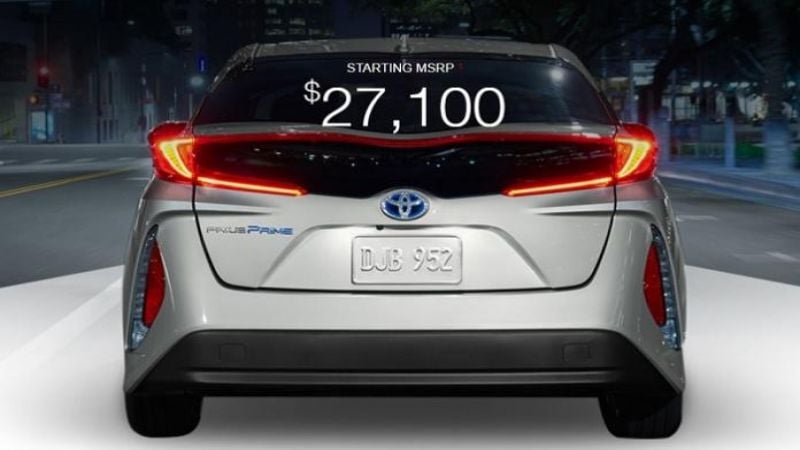I understand the Model X is in a completely different price category, so I’ll let that go. Although the Bolt EV has 238 miles of electric range, perhaps it occasionally loses, due to the current (pun intended) lack of charging infrastructure, which limits its capability to take on a long, cross-country trip, where a hybrid is unlimited. However, its obvious competitor is the Chevy Volt and they’ve been pretty competitive, in sales, with the Volt winning four months this year, versus the Prius Prime winning in three.
Disclaimer: My household has owned/leased five Chevy Volts since 2012 and I changed careers to work for my Chevy dealer.
First, I get there’s a significant different in pricing, with the Chevy Volt starting at $34,095 and the Prius Prime at $27,995. That’s a difference of $6,100. But that’s not the whole story on pricing. The Volt’s larger 18 kWh battery pack qualifies it for the full $7,500 Federal Income Tax credit, whereas the Prius’ smaller 8.8 kWh battery only receives $4,502 of the tax credit. This reduces the price advantage, enjoyed by the Prius Prime to $3,102. If financed for 72 months at 9%, that’s a monthly payment difference of $56. That’s still a somewhat significant advantage for the Prius Prime.
But then, let’s consider performance.
Let’s start with electric range: The Volt averages 53 miles, on electricity before switching to gasoline, according to the EPA. The Prius’ average all-electric range is just 25 miles, or less than half of the Volt’s range. In real life commuting, that gives the driver of the Volt a much better shot of achieving fully electric driving. If the driver has no access to chargers, at work, that presents a problem for drivers of the Prius Prime: A U.S. Department of Transportation study, in 2003, found the average commute distance of Americans is 15 miles, one way. That means the Prius will only provide 83% of that round-trip commute on electricity, while the Volt driver would enjoy a 100% electric commute. Restated, the average commuter, driving a Prius Prime, will have to run their gas engine for part of the commute, while the Volt driver would run solely on electricity.
As it turns out, I drive the average 15 miles one way and although I drive my Volt like I stole it, I can easily commute on electricity alone, even if I run errands at lunch or after work. In fact, over the past 18 months of ownership, I have driven 96% on electricity, as I’ve taken a few out-of-town trips.
The Volt’s superior electric range wins.
On gasoline, the Prius Prime does significantly better than the Volt. On gasoline, the Prius averages 55 MPG, compared to the Volt’s 42 MPG. That’s a 31% advantage, but it is important to note that it only comes into play, during a daily commute, if the round trip is greater than 76 miles! In other words, you’d have to commute 19,760 miles, per year, to break even on fuel cost, with the Volt. That is 11,960 more miles than driven by an average U.S. commuter, going back and forth to work.
That’s how far you have to go, before the Prius Prime’s gasoline efficiency makes up for the Volt’s electric range superiority. (calculations based on gasoline at $2.27 per gallon and electricity at 11¢ per kWh).
That is well beyond the commute suffered through by the vast majority of U.S. drivers.
Although MPG and MPGe are easily quantifiable, there are other things to consider:
The Volt is said to be a five passenger vehicle, while the Prius Prime seats four. In all honesty, I’d have to call the Volt a 4-1/2 passenger car, the 1/2 representing a child in a car seat or bolster seat.
Driving performance, in my opinion, has to be a major consideration. According to Motor Trend’s tests, the Volt accelerates to 60 miles per hour in 7.5 seconds, while the Prius takes 10.2 (best case). Imagine what that means, getting on the freeway. This was the primary reason I opted for my first 2012 Volt, after test driving it and the 2012 Prius (long before there was a plug-in Prius). In a word, I felt the Prius’ performance was gutless.
Even acceleration at higher speeds, shows off the Volt’s superior performance. If traveling at 50 MPH and you need to suddenly accelerate to 70 MPH, the Volt gets there in 5.1 seconds, compared to the Prius’ 7 seconds.
Then there is styling. This is an extremely personal consideration. But honestly, unless you’re trying to make the statement, “Oh, look at me. I drive an efficient hybrid!” can you honestly say the Prius Prime looks better than the Volt?
Are these advantages worth an extra $56 per month? That’s for you to decide. Obviously, it is for me. Also see my comparison of Chevy Volt vs Bolt EV from a Volt owner's Perspective and another disclaimer about me.
Comments?
Set Torque News as Preferred Source on Google












Comments
I bought a 2017 Prius Prime,
Permalink
I bought a 2017 Prius Prime, brand new from the dealer, in November. I actually drove 1,000 miles to get the car because I found a steal of a deal in New York state where, after all the rebates and incentives, I paid $19,700 for it and my interest rate is 3.69%. My commute is ~3 miles a day, 6 if I go home for lunch, so I'm almost always in electric mode. Also, my battery capacity is well above the published 25 miles, I currently get 38.1 on a full charge, so I only have to charge it once a week. My previous commute with this car was ~70 miles and since there was a free charger at my work, I had no issues. Though in the winter and when the wind was blowing hard, I'd have to kick it into gas mode for the last mile or 2 to make it home. But still, after 18,000 miles, I'm more than happy with the Prime. I just wish it had as much storage space as my old Prius; but that's getting nitpicky as I don't haul that much stuff around.
Hi,
Permalink
Hi,
I think a primary reason Prius Prime does well in the plug-in market is that the Prius Atkinson Cycle CVT engine is simply a great engine. Sure, it isn't the fastest accelerating. I have seen these statistics for a long time. I have a 2010 non-hybrid Prius that I have driven all over in cities and elsewhere and I have NEVER found acceleration to be a problem. So who cares about 0-60 figures, as long as it is what you need? I personally think the 0-60 rating is the most overstated statistic there is for cars. If you are a responsible driver, it really doesn't matter in the real world.
The one weakness of the Prius Prime in my opinion is interior styling. It's OK, but it really could be better. The black-white thing on the dash is stupid. But it's a great car.
I have owned both the Volt
Permalink
I have owned both the Volt (2015) and the Prime (2017). I commute 32 miles each way and have charging at work (level 1). During all months but a few in winter, my Prius never uses gas. The 25 mile range is really if you are traveling at 65mph blasting the AC. This was the selling point for me, I also occasionally have to drive 600 miles to another site at work, which the Prius easily beats the Volt in.
Both cars are good, but, the Prime is cheaper month by month and much more interesting to drive then the Volt.
I'm six foot tall, the Volt
Permalink
I'm six foot tall, the Volt was very uncomfortable. ICE reliability is also still an open question for the Volt design.
I bought a Prius Prime to
Permalink
I bought a Prius Prime to replace my 15 year old Prius, with more than 250,000 miles on it. Part of the reason I got such a long life from the Prius is that parts for it are cheap and easily available. For example, the touch screen failed a few years ago, but I found a used one on EBay for $150 and replaced it myself.
I fully intend to drive my new Prius Prime for 15 years as well, so my experience with the reliability of the Prius, combined with the wide availability of cheap parts, lead me to buy a Prius again. Because of the government rebate, a Prius Prime cost about the same as a Prius, so I went for the plug-in.
Another advantage of the Prius Prime are the standard safety features. I am happy with the base Prius Prime, but it costs extra to get some of the features on a Volt, increasing the price differential.
Since the acceleration of the Prius Prime is acceptable to me, the only real advantage of the Volt is the larger battery capacity. But the benefit of that extra capacity is partly offset by longer charge times and lower efficiency (from the extra weight of batteries).
All things considered, the Volt and Prius Prime are both very nice cars. If there were no Prius Prime, I might have picked a Volt over a regular Prius, now that I know how nice it is to drive a (mostly) EV car. But for me, and apparently many others, the advantages of the Volt do not outweigh the advantages of the Prius Prime.
For 8 years I had the
Permalink
For 8 years I had the immediately previous model body Prius. When I was ready for a new Prius I hated the new/current Prius design (the back end of the car) so much that I bought outside Toyota altogether.
Pagination